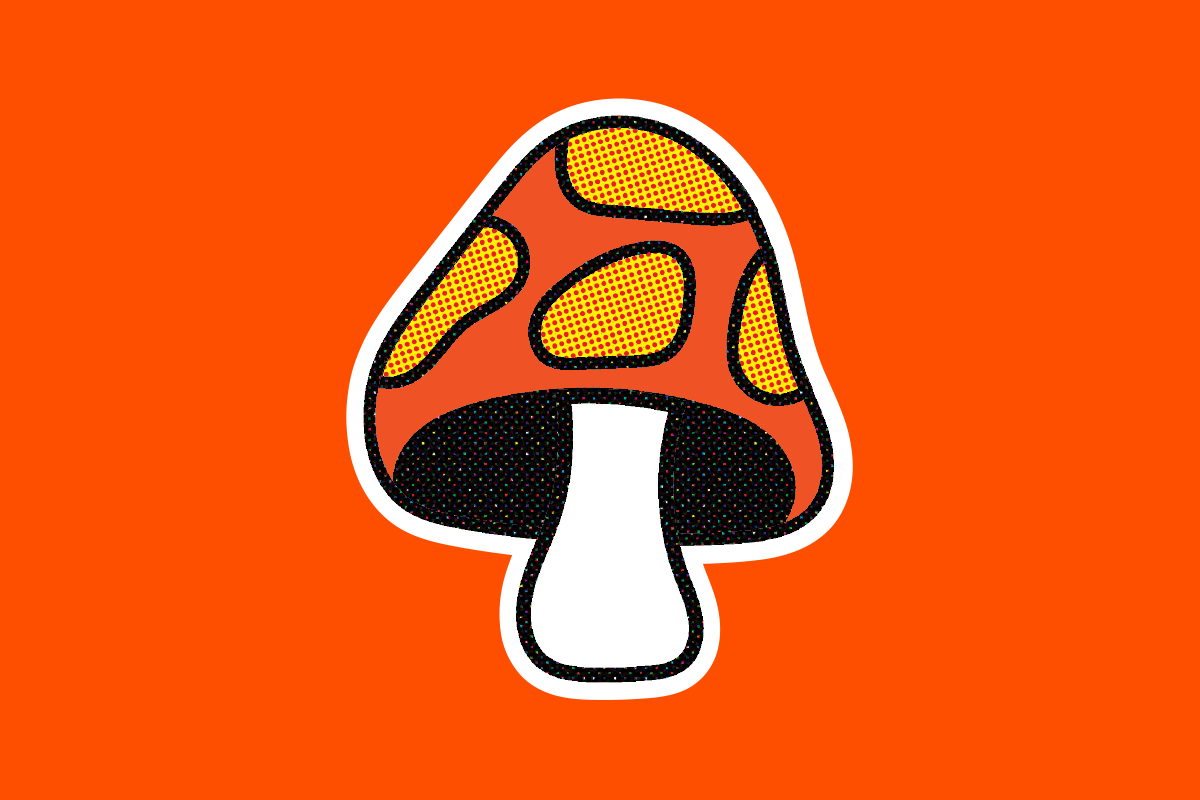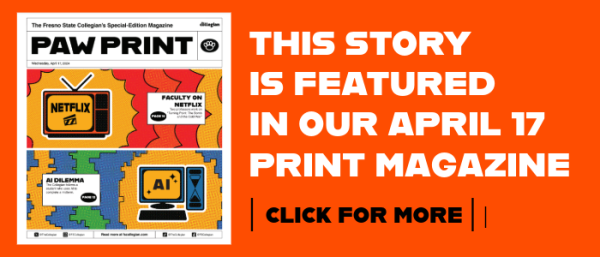The intersection of psychedelics in the mental health space has emerged in recent years during a time when tens of millions of Americans are struggling with their mental health. While public health organizations struggle to tackle this issue, a wealth of psychedelic research has quietly been snowballing since the 1950s. This new wave of research found itself being promoted at Fresno State.
Treat Humanity, formerly known as Treat California, hosted an event on campus last October to discuss the potential future of psychedelic medicine and therapy. Flyers around campus were posted to promote the event, stating:
“Everyone is invited to learn, be inspired and take action to help students gain access to the next generation of medicines and therapy.”
Jeannie Fontana, Treat Humanity CEO, told The Collegian her reasoning as to why she is pushing for this new model of treatment.
Psychedelics, or hallucinogens, are a class of psychoactive substances that produce changes in perception, mood and cognitive processes, according to the Alcohol and Drug Foundation. Multiple types of psychedelic drugs have a vast array of effects and uses.
One of the most iconic and widely studied hallucinogens is psilocybin mushrooms, commonly known as “magic mushrooms.” Psilocybin, which gets processed by the body into psilocin, is the active ingredient found in over 200 different species of fungi. Psilocybin mushrooms have been crucial in garnering interest and advancing the study of psychedelics.
Fontana is no stranger to cutting-edge science and has played a crucial role in contributing to the California Institute for Regenerative Medicine, the largest stem cell granting agency in the world. Fontana has an MD in Internal Medicine, a Master of Science in Environmental Toxicology and Health, as well as a doctorate in biochemistry and molecular biophysics.
“I call myself a frontier wave surfer,” Fontana said. “Always trying to catch the wave. Like what’s the boundary between the known and the unknown, and how it can affect millions of people? That’s kind of where I swim.”
Fontana said a drastic paradigm shift in views on therapy are necessary in this new approach to treating psychological illness.
“I do not see it as you come in for one psilocybin experience with a guide and you’re done,” she said. “No. This ends up being multifaceted including addressing diet, exercise, meditation, yoga, whatever other tool that person may like. We have to start addressing the complexity of what constitutes a human being and you can’t just fix something with one pill.”
Around 50 million Americans suffer from mental illness, reported Mental Health America as of 2023. NBC reported that last year over 50 thousand Americans committed suicide, which is more than any other year on record. Over 100 thousand of those deaths are estimated to be overdose deaths, according to NPR.
Americans are currently confronting the most significant mental health crisis in our history, which is exacerbated by an opioid epidemic resulting in a potent blend of fatalities and community devastation. An estimated 21 million American adults are affected by major depression. 30% of those diagnosed with major depressive disorder experience treatment-resistant depression.
Although the current treatment of selective serotonin reuptake inhibitors (SSRIs) to combat things like depression, anxiety and other mental illnesses has been found to be effective, more people are reported struggling with their mental health now than ever before.
Modern psychedelic research has seen MDMA (Methylenedioxymethamphetamine), and psilocybin as the most studied psychedelic substances. The organization MAPS (Multidisciplinary Association for Psychedelic Studies) is attributed with great success in the study of MDMA treatments for Post Traumatic Stress Disorder.
MAPS has completed two phase three trials of MDMA-assisted therapy in which they have found that 88% of participants with severe PTSD experienced a significant reduction in PTSD diagnostic scores, compared to the 60% of placebo participants.
MAPS was founded in 1986, following the 1985 federal MDMA ban. With over 30 years of research, the organization has become the first agency to submit an NDA submission for psychedelic-assisted therapy and receive priority review from the FDA.
Felipe Marcado, Fresno State College of Health and Human Services assistant professor, told The Collegian how he grew up exposed to the topic of psychedelics due to his grandpa being shaman with indigenous roots.
“As I got older I learned about the research and started getting into healing groups myself,” Marcado said. “As I learned about diagnosis and these new healing modalities in the cultural aspect, I was wondering, how can I bring this into the social work world? How can I bring this knowledge and understanding to Fresno State and the Central Valley?”
Indigenous groups have been using psychedelics in a religious and medicinal context for thousands of years. One of the more well-known examples occurs in Native American cultures through the ingestion of peyote as a religious sacrament during ceremonies. A common practice is to cut off what is known as “mescal buttons” on the top parts of the plant. The buttons are then soaked in water to produce a psychoactive medicinal cocktail.
Prior to the 1994 amendment of the American Indian Religious Freedom Act which legalized the use of peyote in a religious context, Native Americans were persecuted and not allowed to participate in what they view as a generational medicinal healing process.
Marcado was asked if the current structures in place are adequately serving the needs of students who struggle with their mental health.
“When we think about manifestations of mental health symptoms, it’s usually because people don’t have bonds. They don’t have connections and there is this trauma that occurs,” he said. “But when you have the proper guide, the mentors and all of these things in place, it’s a lot easier for you to recover. I think that in our environments we don’t have those things. In our universities we continue to push things that just don’t make sense and don’t help people’s mental health.”
Johns Hopkins received a $4 million federal grant from the National Institutes of Health for the first time in 50 years to study the impact of psilocybin on tobacco addiction. The three-year study began in 2021.
“The researchers suggest psilocybin might help break the addictive pattern of thoughts and behaviors that has become ingrained after years of smoking, thus helping people to quit the habit,” Johns Hopkins reported in a news release.
With all of this new research and momentum compiling, researchers and psychologists are tackling the fundamental question of how psychedelics affect the brain.
One of the clues lies within what is known as the claustrum, a small bilateral piece of gray matter inside of the brain. Although the role of the claustrum is not fully understood, it is thought to play a crucial role in coordinating neural activity across different functional networks.
“When it is functioning normally, the claustrum is essentially acting like a switchboard; it’s trying to help other brain regions figure out when to turn on and when to turn off,” said Fred Barret, a neuroscientist at the University of Johns Hopkins to PBS Nova. “But when we experience a psychedelic drug, we believe that it is binding to specific receptors in the claustrum and somehow disrupting and disorganizing the claustrum. It’s almost as if the switchboard walks away.”
The current socio-political climate of the use of psychedelics is quickly becoming one of the more mainstream conversations taking place across the country with states like Colorado and Oregon becoming the first to decriminalize certain psychedelic drugs.
A renewed cultural psychedelic renaissance is taking place simultaneous with scientific data emergence.
Michael Pollan, a professor at Harvard University and the University of California, Berkeley where he co-founded the UC Berkeley Center for the Science of Psychedelics, attained a successful career as an author writing about the sociocultural impacts of food.
Time Magazine named Pollan as one of the most influential people in the world in 2010.
Pollan’s first book on psychedelics “How to Change Your Mind: What the New Science of Psychedelics Teaches Us About Consciousness, Dying, Addiction, Depression, and Transcendence,” became a #1 New York Times best seller. The book was also adapted into a Netflix docuseries.
In a 2018 interview with GQ, Pollan discussed his reasons for excitement regarding psychedelics.
“What excites me is the potential of these medicines to help people for whom we don’t have a lot to offer,” Pollan said. “Mental health care in this country and worldwide has not been that effective. We still deal with very high rates of mental illness, and that’s all getting worse. The last important innovations were in the early ’90s, with the introduction of the SSRIs, and not too much has happened since then. So the idea that we might have a tool that could help with a whole range of different problems—from addiction and depression to obsession and anxiety—that’s very exciting.”
Pollan said one of his concerns is that our culture tends to swing from complete prohibition to complete legislation and if a lot of charlatans get into the research space it can become an issue.
It is important to note that the overwhelmingly optimistic descriptions of psychedelic trips can lead people to believe that these experiences are all positive when that is not the case.
Some of the risks according to Portland Psychotherapy include challenging experiences of difficult emotions, the risk of psychosis or mania, physical safety, interactions with current medications and drug purity.
Canadian physician Gabor Maté shared some of his apprehensions within public perception during a 2022 psychedelic-assisted therapy global summit.
“This is no rose garden we’re talking about here,” Maté said. “We’re talking about really confronting all of the stuff that you are carrying inside.”
The FDA is set to finish the review of an application for MDMA-assisted therapy by Aug. 11, 2024. Gov. Gavin Newsom recently signed AB 1021 which would allow for MDMA and psilocybin prescriptions if the federal government reschedules the substances.
“California should immediately begin work to set up regulated treatment guidelines — replete with dosing information, therapeutic guidelines, rules to prevent against exploitation during guided treatments and medical clearance of no underlying psychose,” Newsom said.
We are currently on the cusp of a potential revolution due to all of these developments in the way we treat mental health in the United States, and the world.
As the way we view and treat mental health changes, so will our communities. In this extremely interesting and exciting time of change, it would be wise to approach this new world with cautious optimism.






Cia • Apr 26, 2024 at 1:28 pm
Fantastic and informative article!
Thank you for the update on a very important healing modality in PTSD, depression and anxiety.
We do need to inform the younger generation dealing with mental health issues that there is a safe way to wellness. It is not a quick fix, but a journey.